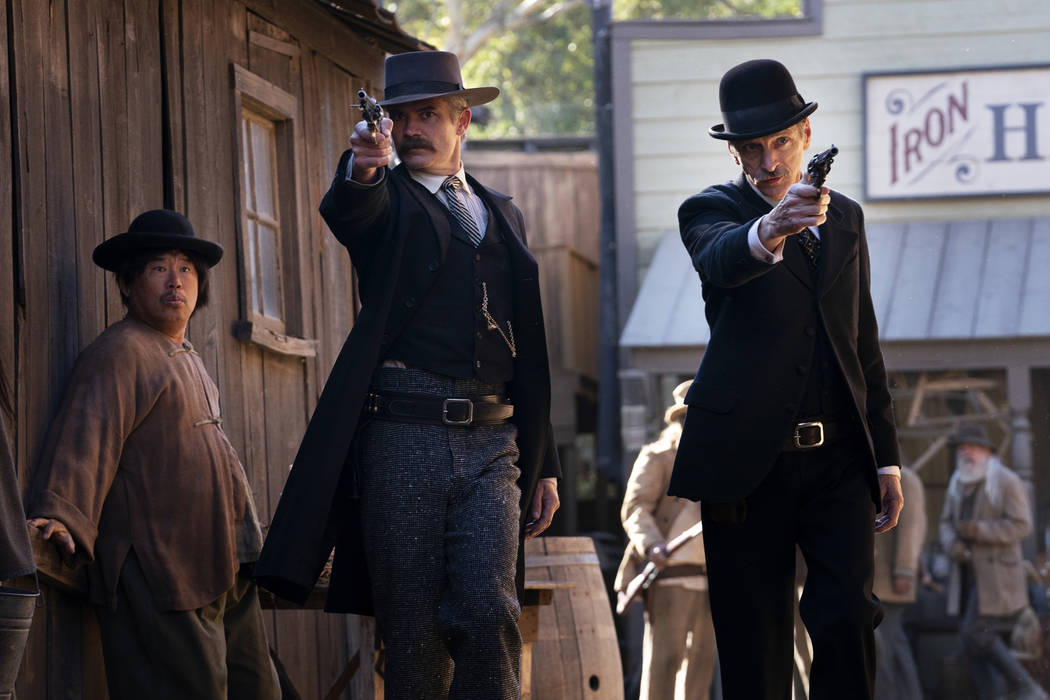‘Deadwood: The Movie’ finally rides onto HBO

It had been prestige television’s answer to “Chinese Democracy,” that delayed-by-a-decade Guns N’ Roses album that no one aside from Axl ever thought would see the light of day.
Asking HBO executives for an update on the “Deadwood” movie was akin to querying O.J. about his hunt for “the real killers.”
Yet, somehow, 13 years after the stellar drama was abruptly canceled, “Deadwood: The Movie” (8 p.m. Friday, HBO) is riding into living rooms — a little older, a little slower — for some long-awaited resolution.
The wordiest of Westerns
The muck-brown Western from “NYPD Blue” creator David Milch was never anything but an outlier. Costly, grim and dense — Milch trafficked in the delivery of 37 stunning words when three would do, a device that played like filthy Shakespeare — “Deadwood” is among the HBO-iest dramas ever.
On the surface, it was the story of former lawman Seth Bullock (Timothy Olyphant), who arrived in the Dakota Territory with his business partner, Sol Star (John Hawkes) — just a Canadian and an Austrian looking to sell hardware in the proudly lawless mining camp.
Underneath, though, it was so much more, namely a loquacious exploration of the moral complexities of a seemingly simple time.
“Deadwood” was populated by historical figures both celebrated, “Wild Bill” Hickok (Keith Carradine) and “Calamity” Jane Cannary (Robin Weigert), and lesser so — toadying mayor E.B. Farnum (William Sanderson), for example, and newspaperman A.W. Merrick (Jeffrey Jones).
The greatest of those — at least from a storytelling aspect — was Al Swearengen (Ian McShane), the murderous, hooplehead-hating proprietor of The Gem Saloon, who helped pave the way for the rise of the TV antihero.
Few in any medium ever cursed as easily or as eloquently.
A dead end in Deadwood
Milch and his crew made the gold-hungry encampment feel like a living, breathing place — which, of course, it had been.
The main thoroughfare that was somehow always muddy, and the way that failed to keep residents from splashing through it in their best duds.
The gambling joint/brothel The Bella Union, with its banner promising “Chicago-style girls” as though they were slices of pizza.
The limited resources, demonstrated by enforcer Adams’ (Titus Welliver) way of greeting a female guest to his room: “I can offer you whiskey, or water that I just washed my face in.”
And the way Al was forever scrubbing blood from The Gem’s wooden floors when it would have been far less labor intensive to just paint the fool things red and be done with it.
In the third season, townsfolk mostly stopped fighting among themselves to galvanize their energies against gold baron George Hearst (Gerald McRaney), who bought up the bulk of the mining claims under false pretenses, called in dozens of hired guns and threatened to destroy everything in his path.
The whole season had been building for war. Wyatt Earp (Gale Harold) and his brother, Morgan (Austin Nichols), rode into town. Hearst had beloved prospector Ellsworth (Jim Beaver) murdered, and sex worker-turned-bookkeeper Trixie (Paula Malcolmson) put a bullet in him for it. Then, in its final moments, Hearst just rode off on a stagecoach, more or less victorious, as the series came to a screeching halt.
The drama was as dead as the cavalcade of corpses fed to Mr. Wu’s pigs.
A fitting conclusion
“Deadwood: The Movie” picks up 10 years later, in 1889, with the “celebration” of South Dakota’s statehood, something the original inhabitants fought against from the moment they arrived in the violent outpost.
Alma Ellsworth (Molly Parker) returns by train to check on her bank. Jane arrives, inebriated yet again, to reconnect with high-end madame Joanie Stubbs (Kim Dickens). And Hearst, the now junior senator from California, is visiting Deadwood for the first time since his hasty exit.
Everyone else is pretty much exactly the way they were when last we saw them — except older. So very much older.
“Deadwood: The Movie” leans into the gray hairs and painted-on wrinkles like a high school production of “Cocoon,” as if to illustrate that 10 years of Deadwood living, with its various hardships and maladies, is equal to 30 or so in city years. Fifty if that city happens to be modern Hollywood.
The odds of any of them surviving a decade in that cesspool are astronomical. Still, it’s wonderful to see almost every character — with the most notable exception of the late Powers Boothe’s Cy Tolliver — back for the send-off.
Despite several flashbacks to the series to reinforce some of the key events, the aftermath of which still lingers, “Deadwood: The Movie” will mean very little to newcomers. The best way to view it is as the culmination of a 36-episode viewing — or re-viewing — of the original series.
The stand-alone movie doesn’t amount to much in the way of plot, but it does — finally, after all these many years — serve as a fitting conclusion to one of TV’s all-time great series.
Take heart, “Game of Thrones” fans. There’s still hope.
Contact Christopher Lawrence at clawrence@reviewjournal.com or 702-380-4567. Follow @life_onthecouch on Twitter.